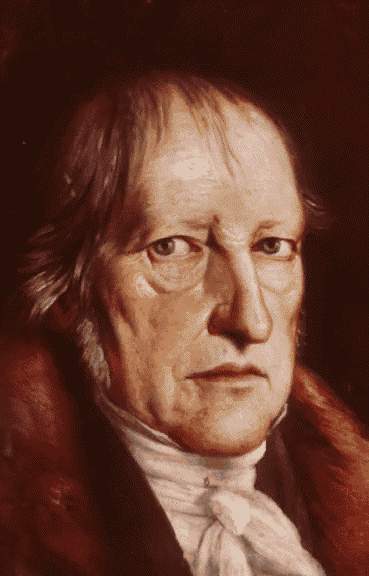
GEORG WILHELM FRIEDRICH HEGEL (1770-1831)
Antigone Lecture Two
Week One
Fall 2005
I. Burial Practices
End of Iliad: Priam goes to his enemy Achilles’ tent to retrieve the body of his son Hector.
Even enemies agree on the importance of burial rituals.
In Antigone
Creon strives mightily to deny Polynices a burial because he is a traitor.
Antigone gives her life in order to bury him because he is a brother.
p. 82 ll. 520-22.
p. 82, ll. 503-08.
Antigone posits a set of ancient laws that no mortal can defy.
Antigone is bound by these laws to defy Creon and bury her brother.
Our own burial practices?
The importance of recovering a loved one’s remains and conducting the proper rituals.
BURIAL TRADITIONS HAVE A HUMAN HISTORY OF EXTRAORDINARY SIGNIFICANCE
II. Interpretations of Antigone
1.Writers: Anouilh, Brecht, Hochhuth, etc..
--Hundreds of versions in drama, prose, poetry, film inspired by Sophocles tragedy
--Antigones and political resistance during the Nazi period
2. Readers:
Hegel was the single-most influential reader of Antigone
 GEORG WILHELM FRIEDRICH HEGEL (1770-1831) |
DIALECTIC : Thesis-Antithesis==opposition
They combine in a Synthesis
aufheben: cancel, preserve, lift up (die Aufhebung; aufgehoben)
Goal of History to be reached through dialectical progress
The references to Antigone are found mainly in his Aesthetics, Philosophy of Right, Phenomenology of Spirit.
From the Lectures on the Philosophy of Religion:
“Creon is not a tyrant, but rather a moral power; Creon is not wrong. He insists that the law of the state, the authority of government be respected and that offenses against the state be punished. Each of these sides realizes only one of the moral forces and has only that as its content; that is one-sidedness and the point of eternal justice is that both sides be wrong because they are one-sided, but simultaneously both sides are right. Both are recognized as valid in the movement of moral principle; here both have their validity but their balanced validity, It is only the one-sidedness, against which justice rises up.”
Hegel says basically that
--Antigone represents family and Creon represents state
--Both are right; Both are wrong. They are right to defend the principles of their realms and wrong because they are one-sided and thus do not reflect the whole moral fabric.
--This one-sidedness is tragic in Hegel’s opinion.
They face off as thesis and antithesis and cannot come to a compromise or synthesis
They both suffer and their sufferings are a means of reconciling opposing moral claims. The suffering that lays bare the tragedy of one-sidedness shows us the way to more balanced and inclusive world views.
p.128, ll.1466-70.
What wisdom do these blows teach us?
-------------------------------------------------------------
Thesis: The strict division of the personal as Family and the political as State that supports Hegel's thinking on the play, while useful, is not necessarily borne out by closer examination of the text. Creon is not purely associated with the State and Antigone is not purely associated with the family.
What is the next step?
Present evidence and argue this evidence.
How do the terms “strict division” and “not purely associated” affect the argument?
The argument will nuance the oppositions and undermine or relativize them.
Evidence:
A. The name: “anti-gone” means literally “anti-generation,” as in someone who is against the generating of human beings within families.
Antigone is a virgin, whose one erotic line expresses a wish to “lie” with her dead brother.
She never once refers to her fiancé Haemon (whose name means blood as in hematology). She dies w/o having “generated.”
B. Antigone’s coldness toward Ismene.:
On p.59, Antigone greets Ismene as “My own flesh and blood—dear sister, dear Ismene.” (l.1).
But on p.60 (ll.44-46) she already begins to insult her grievously.
On p.64, she promises to hate her in death and to haunt her.
On p.87, Ismeme asks “Why abuse me so?” Why?
C. Antigone’s political statements: While tormenting her own flesh and blood, Antigone also speaks of rules and rights and justice as if she were there to enforce law.
P. 82. [read 499-511]
Here she tells the king what the law is and whose law takes precedence—not talking about feelings or family here, but LAW and politics.
D. Her explanation of her defiance: mysterious lines on p.105 (995-1004)
We can see Antigone as representative of kinship—she buries Polynices BECAUSE he is her brother—but we can also see where she falls short of a full representative function..
What about Creon? How do his actions reflect kinship?
A. He has lost his son Megaerus in the battle against Polynices’ forces.
B. Creon sees household and state as a more or less seamless continuity:
“Show me the man who rules his household well/I’ll show you someone fit to rule the state” (94, ll.739-40)
.
P.93 (ll.713-22)—sons’ duty
Tiresias’ reproach (115). Time is running short: Antigone, a living woman is buried below and Polynices, a dead man is still above ground. The gods have stopped hearing prayers because the altars are befouled with bits of carrion ripped from the corpse by birds and dogs.
C. What changes Creon’s mind?
Tiresias prediction (115) that Creon will lose “one born of your loins, your own flesh and blood.”
Pp.116-17, 11.1214-1230.
Of course it is too late and Creon suffers horribly because he loses a spouse and a child, precisely the family members whom Antigone has identified as replaceable
If we do choose sides, we are not necessarily choosing between family and state since family and state are essential elements of both sides of this opposition. Antigone’s defiance is in many ways a political act and Creon’s suffering is occasioned by his family ties.